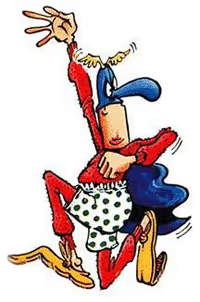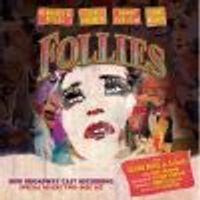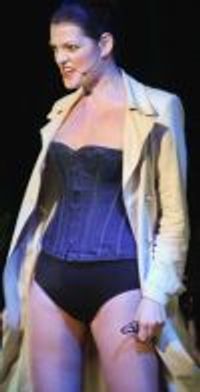Unpopular opinions you hold
#275Unpopular Opinions
Posted: 11/27/11 at 3:52pmSHREK deserved the Tony over BILLY ELLIOT......... I think I'm the only one who thinks that lolz
#276Unpopular Opinions
Posted: 11/27/11 at 3:59pm
I not only like Mandy Patinkin and all his mannerisms, but I also think he's hot.
I second this... but more so in his younger days.
TheHappyPhantom
Featured Actor Joined: 8/25/11
#277Unpopular Opinions
Posted: 11/27/11 at 4:32pmJetts, you are most definitely alone in that. I wouldn't have even nominated Shrek.
#278Unpopular Opinions
Posted: 11/27/11 at 4:32pm
Others have questioned why Sondheim has not written a musical with a major gay or Jewish character. Me too.
On a deeper level, Sondheim seems to have no feel for jazz. Has he ever mention Duke Ellington in an interview, article or book?
TheHappyPhantom
Featured Actor Joined: 8/25/11
#279Unpopular Opinions
Posted: 11/27/11 at 6:04pmMaybe Sondheim realizes his race and sexual orientation don't define him. Minorities don't owe each other work that focuses on themselves. These are individuals. Sidenote: Road Show is pretty gay...
Gaveston2
Broadway Legend Joined: 6/28/11
#280Unpopular Opinions
Posted: 11/27/11 at 6:08pm
"Gaveston2, I thing the problem with the lyric is "and the other was blue" sounds like it's fishing for a rhyme. I've imagined a line reading making sense of it by saying it in disgust, conveying that one was borrowed and the other is blue, which is not my color. Unfortunately, I've never heard that line reading, so I wonder "why is it important that the other was blue?" and it doesn't make much sense without justification."
Why? It's not like a blue dress is so unusual.
Phyllis is not disgusted, she is amused and self-deprecating that it took her so long to get ready when she only had two choices of what to wear.
If she had a dialogue line that read, "Back in those days, I had a grand total of two dresses--and one of the them wasn't even mine. I owned this one little blue dress and borrowed a second dress from a friend" nobody would bat an eye.
But rhymed couplets necessarily condense language: pull them out of context and most can be made to sound artificial. In the lines in question, however, Sondheim violates no grammatical rule, he doesn't employ words outside the character's vocabulary, and, in fact, he actually communicates quite a bit in two simple lines.
I'm not nominating that couplet as "Best in Broadway History" or anything, but as lyric writing goes, it's far better than most. And while it isn't a pastiche number, those two lines are the type for which Dorothy Fields is quite rightly praised because they sound like a real person talking.
(ETA: I wonder that you guys aren't complaining about the equivalent couplet:
"Very young and very old hat,
Everybody has to go through stages like that."
This lyric written to the same musical phrasing is far more self-consciously philosophical. I think it's brilliant, but it's far less likely to be something the characters would actually say.)
Updated On: 11/27/11 at 06:08 PM
Miranda3
Featured Actor Joined: 8/20/11
#281Unpopular Opinions
Posted: 11/27/11 at 6:52pmGaveston & Danny, Re the "borrowed" and "blue" dresses: I thought Sondheim, in choosing those particular two words, was alluding to the old adage that at her wedding a bride should wear "something borrowed and something blue" for luck. I don't mean to pin this interpretation on Sondheim, but this allusion could be a little tossed off irony, given what follows after Phyllis snags Ben and the two marriages end up in shambles.
#282Unpopular Opinions
Posted: 11/27/11 at 7:35pm
If Next to Normal gets (deserved) negative attention for its portrayal of mental illness, I guess I can just say The Light in the Piazza is a little bit creepy for me to get behind as a love story given the background of the mental state of Clara.
The Pet Shop Boys produced Liza Minnelli rendition of "Losing my Mind" is great and needs to be more widely heard.
I get the Lea Michele hate but I feel like it is one thing to be critical of over-exposure, but I think she is a fine singer (though should be singing pop bubblegum ballads and torch songs ad nauseum) and does what she can with slipshod writing. I cannot speak for her alleged diva behavior, which is a whole other issue in my book. Naya Rivera, however, is rightfully getting the right amount of notice now in both her singing and acting. I would not be surprised if she did do a show on Broadway.
I actually think Josh Gad is great in The Book of Mormon but find him pretty revolting and one-note in everything else, a lot of which I saw after TBoM.
I sort of am keenly interested in Tom Cruise's performance in The Rock of Ages movie. More in a train wreck, can't look away interest but still, interest.
Updated On: 11/27/11 at 07:35 PM
#283Unpopular Opinions
Posted: 11/27/11 at 7:37pmI could see Two Gentlemen of Verona dozens of times and be constantly delighted. I hope I don't have to sit through Follies again.
#284Unpopular Opinions
Posted: 11/27/11 at 8:14pm
"The Pet Shop Boys produced Liza Minnelli rendition of "Losing my Mind" is great and needs to be more widely heard. "
I adore it and I think it works on many levels, not just camp. That whole PSB produced Liza album is flawless IMHO and while some theatre people who dislike pop hate it, I think it's Liza's only cohesive album (if we don't count cast albums and soundtracks. Then again I also LOVE the PSB musical, Closer to Heaven, which truly shows what fans of Sondheim and R&H they are--it's too bad it has such a cliche and paper thin book by Jonathan Harvey (who hasn't really done much of merit aside from his breakout Beautiful Thing). At the least it deserves to be heard more and not just looked down upon as another failed attempt by pop artists to do a musical--it's one of the few examples I can think of where someone has tried to take modern music (granted it sounds more like the 80s than 2000), including dance, and honestly use it to serve the plot and characters.
I still think the Tales of the City musical had a lot going for it, and if somehow they can get a handle on the second act's problems, could have a long life at least regionally. I recently re-read the first two novels and it is amazing how much they did capture (yes I know this is an unpopular opinion--hence the thread). At the least it deserves a recording.
Gaveston2
Broadway Legend Joined: 6/28/11
#285Unpopular Opinions
Posted: 11/27/11 at 8:56pm
"Gaveston & Danny, Re the "borrowed" and "blue" dresses: I thought Sondheim, in choosing those particular two words, was alluding to the old adage that at her wedding a bride should wear "something borrowed and something blue" for luck. I don't mean to pin this interpretation on Sondheim, but this allusion could be a little tossed off irony, given what follows after Phyllis snags Ben and the two marriages end up in shambles."
Miranda, I'm sure you're right that Sondheim was aware of the borrowed/blue allusion to wedding traditions. Phyllis is certainly smart enough to comment ironically on the fact that many chorus girls in the era under discussion worked in the theater only long enough to attract a husband.
On reflection, I think the line jumps out at some people because we usually compare two things on the same basis. If the lines were:
"WHICH DRESS FROM MY WARDROBE OF TWO?
ONE OF THEM WAS BURGUNDY, THE OTHER WAS BLUE"
nobody would even notice. It's the mismatch of "borrowed" (ownership of dress) with "blue" (color of dress) that strikes some ears as unusual. To my ear, however, the couplet stands out as fresh and true to character.
For that is exactly the sort of sarcastic wisecrack Phyllis makes throughout the show. (My favorite from the 1971 book: "We haven't had an honest talk since 1942. Do you think the Japs will win the war?" I don't know if the un-PC use of "Japs" survived in later versions.) Phyllis knows perfectly well she is making a minor joke by contrasting a borrowed dress with a blue one. She speaks in such wisecracks as a defense mechanism until "Could I Leave You?", when she lowers the barriers and speaks (sings) the truth.
Moreover, if Sondheim had gone with my burgundy/blue couplet above, it might not have bothered anyone, but it also wouldn't have invoked eras (the Depression and WWII) when clothes were scarce enough to be shared by young girls just out on their own.
Hell, as late as the 1970s, I knew actresses who pooled their money and bought one, really nice audition dress. Whoever had the audition got to wear the dress. (Yes, this sometimes ended in conflict when more than one of the owners was up for the same part.) This is the sort of thing evoked by Sondheim's choice of words.
The color of the dresses doesn't matter, but the fact that half her wardrobe didn't even belong to her matters very much.
(ETA: Sondheim also could have written, "One of them was borrowed and the other was new." But a "new" dress would have seemed to contradict the poverty Phyllis is describing. The lyricist knew what he was doing.)
Updated On: 11/27/11 at 08:56 PM
Miranda3
Featured Actor Joined: 8/20/11
#286Unpopular Opinions
Posted: 11/27/11 at 9:05pm
Gaveston: Your analysis below is spot on, IMO. I hadn't connected the dress comment with the wisecracks prior. Kudos!
For that is exactly the sort of sarcastic wisecrack Phyllis makes throughout the show. (My favorite from the 1971 book: "We haven't had an honest talk since 1942. Do you think the Japs will win the war?" I don't know if the un-PC use of "Japs" survived in later versions.) Phyllis knows perfectly well she is making a minor joke by contrasting a borrowed dress with a blue one. She speaks in such wisecracks as a defense mechanism until "Could I Leave You?", when she lowers the barriers and speaks (sings) the truth.
Jackson Upperco
Chorus Member Joined: 8/5/10
#287Unpopular Opinions
Posted: 11/27/11 at 9:09pm
SWEENEY TODD is far from Sondheim's greatest work.
The original production of CHICAGO was infinitely better than the current revival.
YOUNG FRANKENSTEIN has a fun score.
OKLAHOMA is given a bit more credit than it deserves in musical theatre history.
The majority of the modern vocal technique is uniform, dull, and annoying to listen to.
TheHappyPhantom
Featured Actor Joined: 8/25/11
#288Unpopular Opinions
Posted: 11/27/11 at 9:29pmHere's one I forgot: I can't STAND Shakespeare. That annoying language does nothing for me, but make me what to run on stage and shake them yelling "speak normally"! He's a good poet, but that's it. I can't take a word of his shows seriously, especially the comedies, which I find particularly painful. One of my all time most hated shows is Midsummer. I find it pointless, stupid, and a waste of time.
Gaveston2
Broadway Legend Joined: 6/28/11
#289Unpopular Opinions
Posted: 11/27/11 at 9:34pm
HappyPhantom, I trust you know that Shakespeare's plays (with the possible exception of a few late ones) appealed to all classes and levels of education in his day. It's just that the language has changed over 500 years and so appreciating his plays takes more work on our parts.
Most of the time, I think it's worth the effort, but I'm certainly not of the crowd that assumes every play he wrote is perfect in the form that has been passed down to us.
#291Unpopular Opinions
Posted: 11/27/11 at 9:49pm
Borrowed/Blue just makes me think of a wedding.
Same here. I don't understand why so much effort is going into analyzing this lyric.
Gaveston2
Broadway Legend Joined: 6/28/11
#292Unpopular Opinions
Posted: 11/27/11 at 10:05pm
"Borrowed/Blue just makes me think of a wedding.
Same here. I don't understand why so much effort is going into analyzing this lyric."
Because some of us care about such things. Somebody cared enough to complain about the lyric and a few of us care enough to defend it.
This is why every computer has a scroll bar.
TheHappyPhantom
Featured Actor Joined: 8/25/11
#293Unpopular Opinions
Posted: 11/27/11 at 10:16pm
"I trust you know that Shakespeare's plays (with the possible exception of a few late ones) appealed to all classes and levels of education in his day."
Yes. Not sure what that has to do with what I said, though.
Gaveston2
Broadway Legend Joined: 6/28/11
#294Unpopular Opinions
Posted: 11/27/11 at 10:23pm^^^^I don't think Shakespeare's language is inherently "annoying". It's just archaic to us. I'm not questioning that it annoys you; I'm just pointing out why.
#295Unpopular Opinions
Posted: 11/27/11 at 10:46pmAndrew Lloyd Webber should only be allowed to write funeral procession music from now on.
#296Unpopular Opinions
Posted: 11/27/11 at 10:51pmI have never seen a performance of I'm Still Here that's angry enough to suit my tastes. I understand that within the context of the show it's not supposed to be an angry song, but I figure enough cabaret singers have done it that at least one of them would have played it angry.
#297Unpopular Opinions
Posted: 11/27/11 at 10:54pm
I have always thought that A New Brain is a wonderful show. I don't understand why it never lasted. It deserved a great run.
Gaveston2
Broadway Legend Joined: 6/28/11
#298Unpopular Opinions
Posted: 11/28/11 at 2:16pm^^^^I agree about the quality of the NEW BRAIN score. I think some of us have trouble identifying with a brain tumor and some of us simply don't want to go there.
Emmaloucbway
Broadway Legend Joined: 10/16/11
#299Unpopular Opinions
Posted: 11/28/11 at 8:00pm
A few more...
- I think Billy Elliot is overrated. So is the current revival of Chicago.
- I like some of Wildhorn's songs/ballads
- Not unpopular in this forum, but I hate celebrity stunt-casting
- I kinda like glee, but can't stand the auto-tuning
- I loved Catch Me If You Can.
Videos








